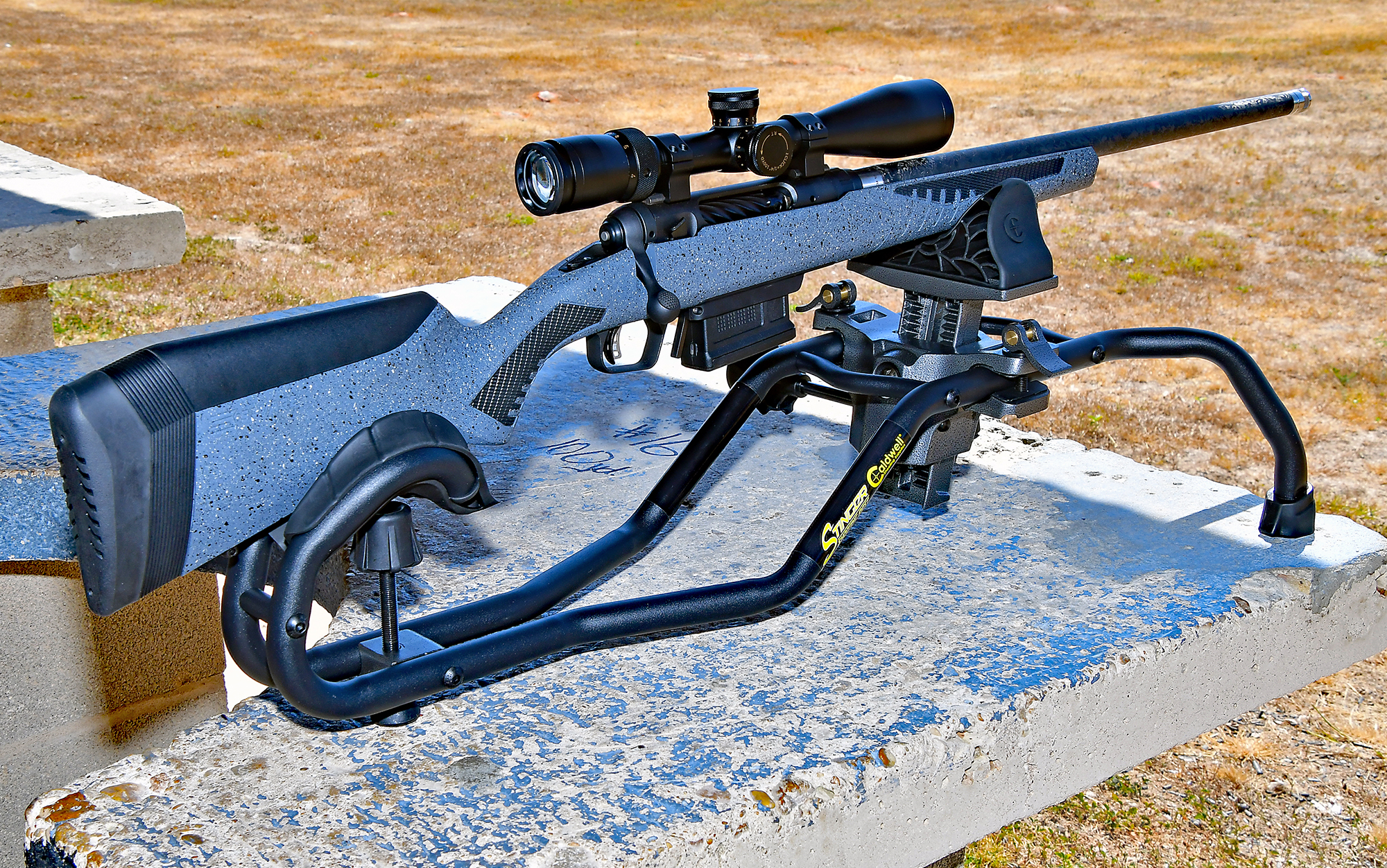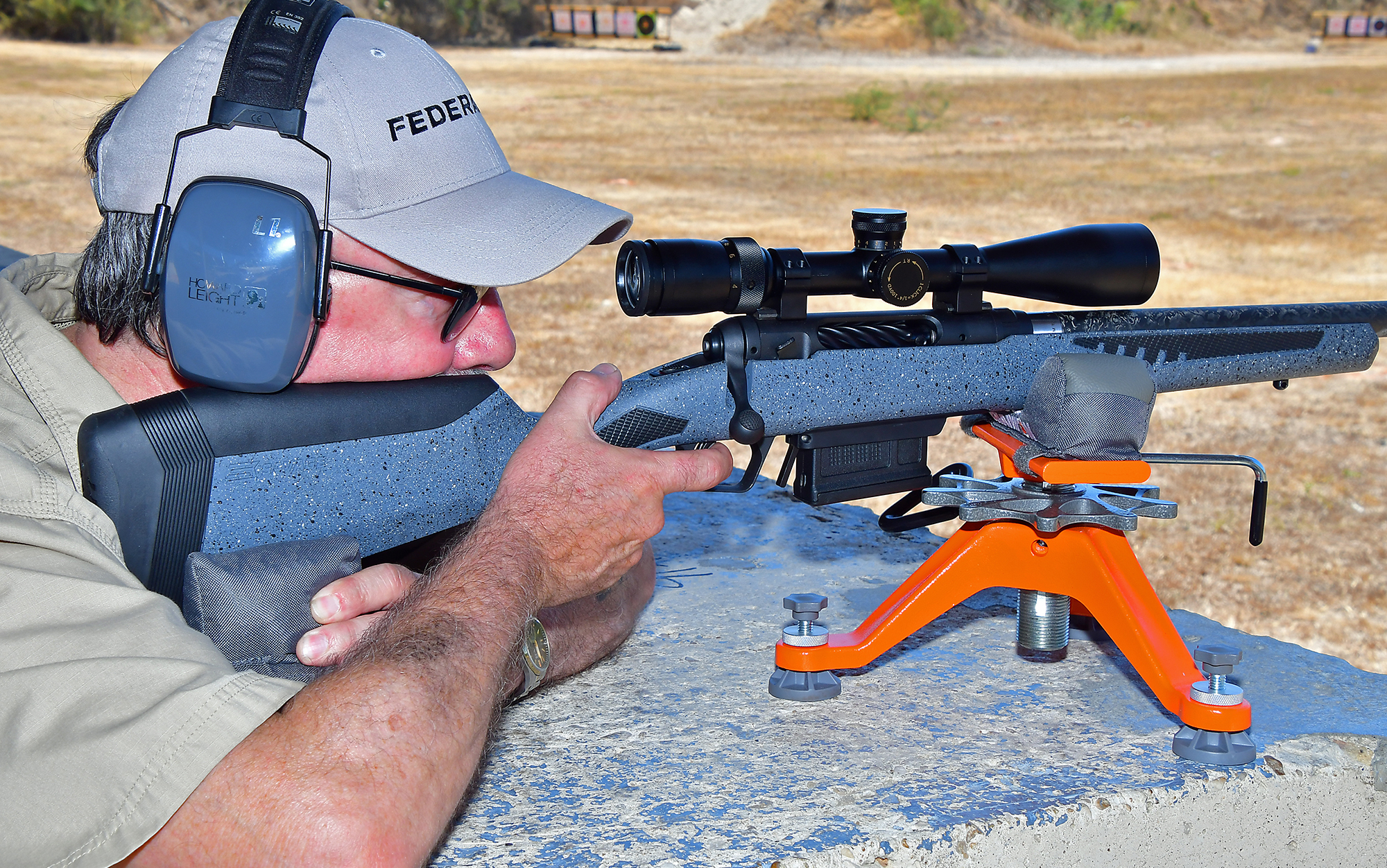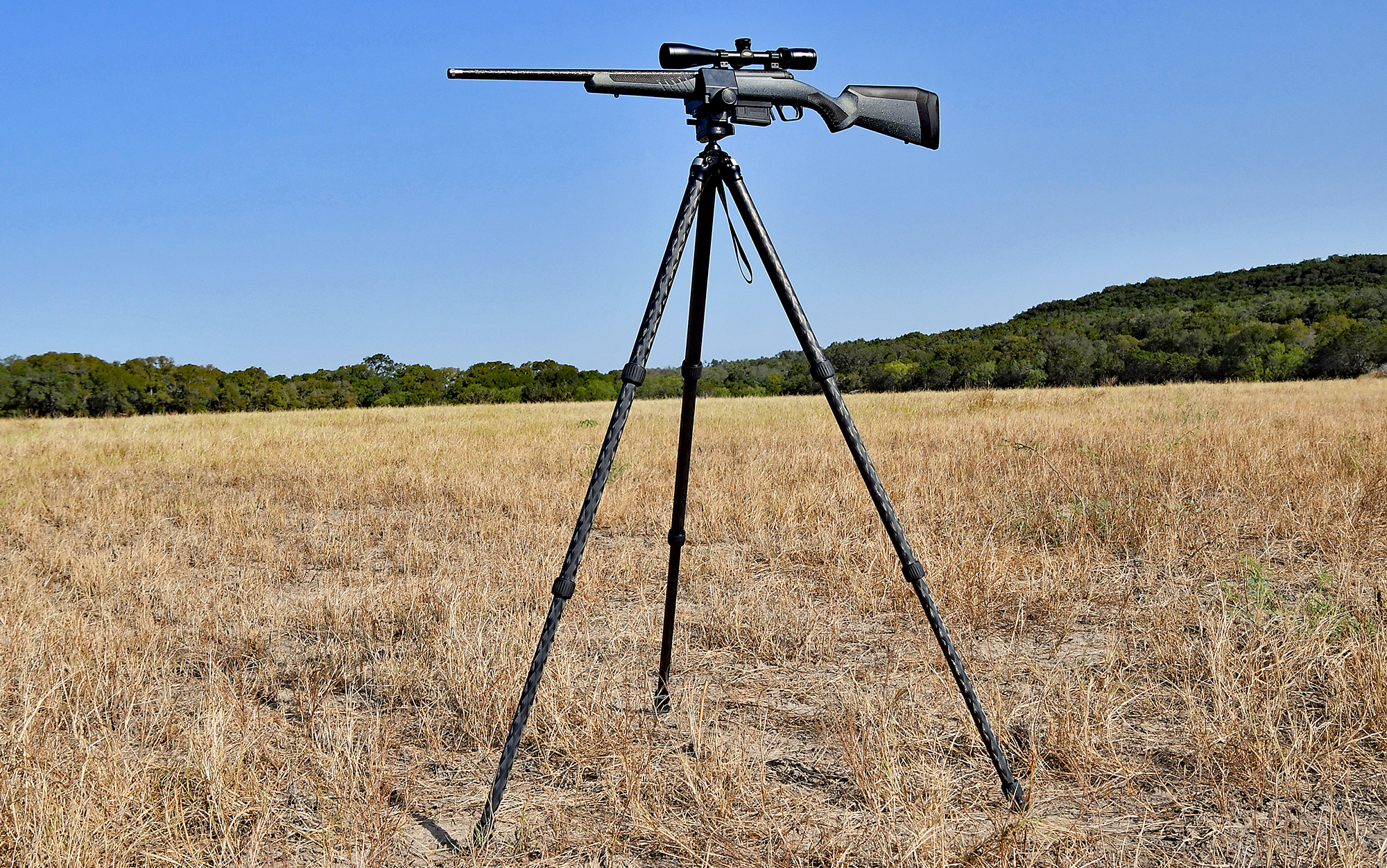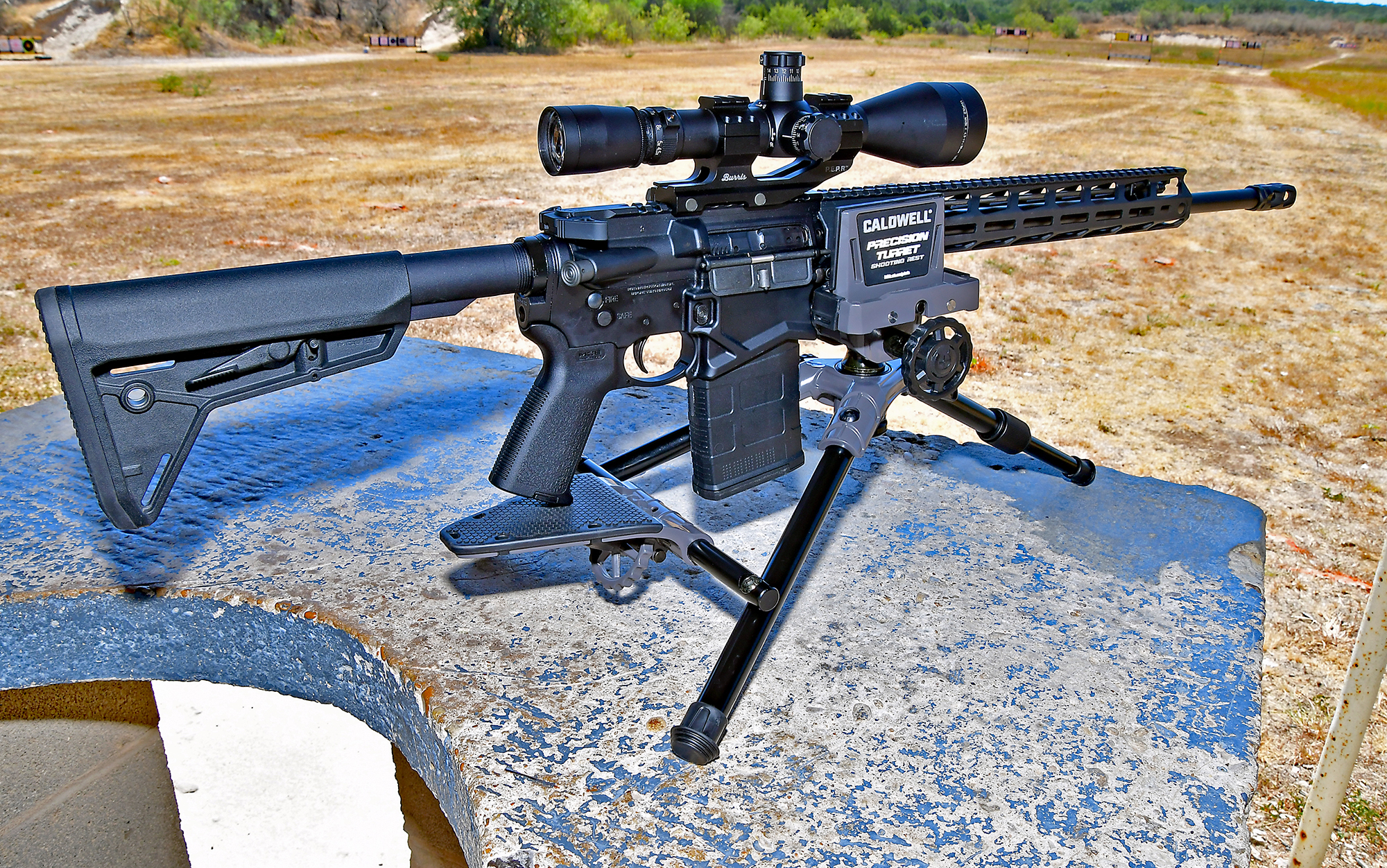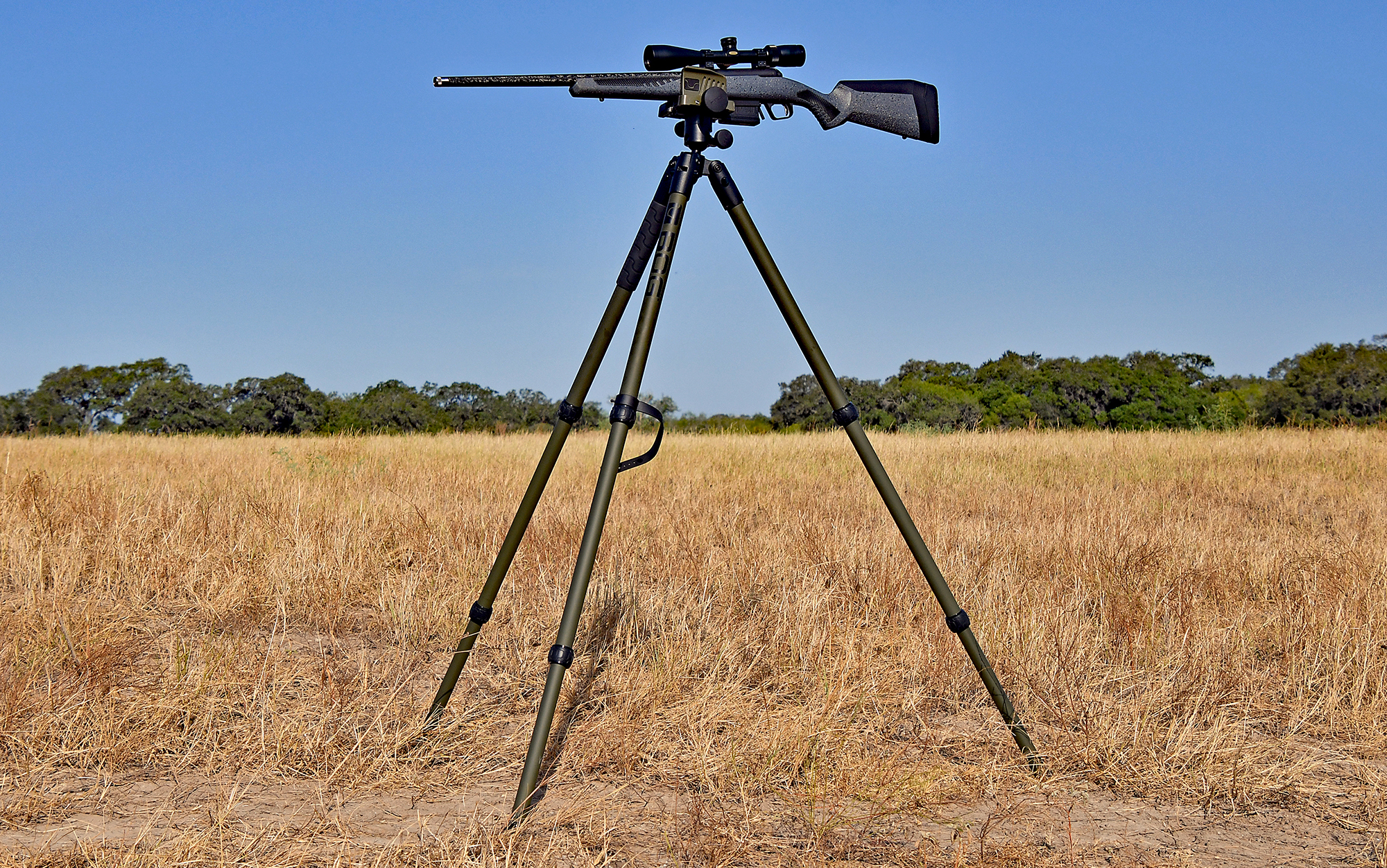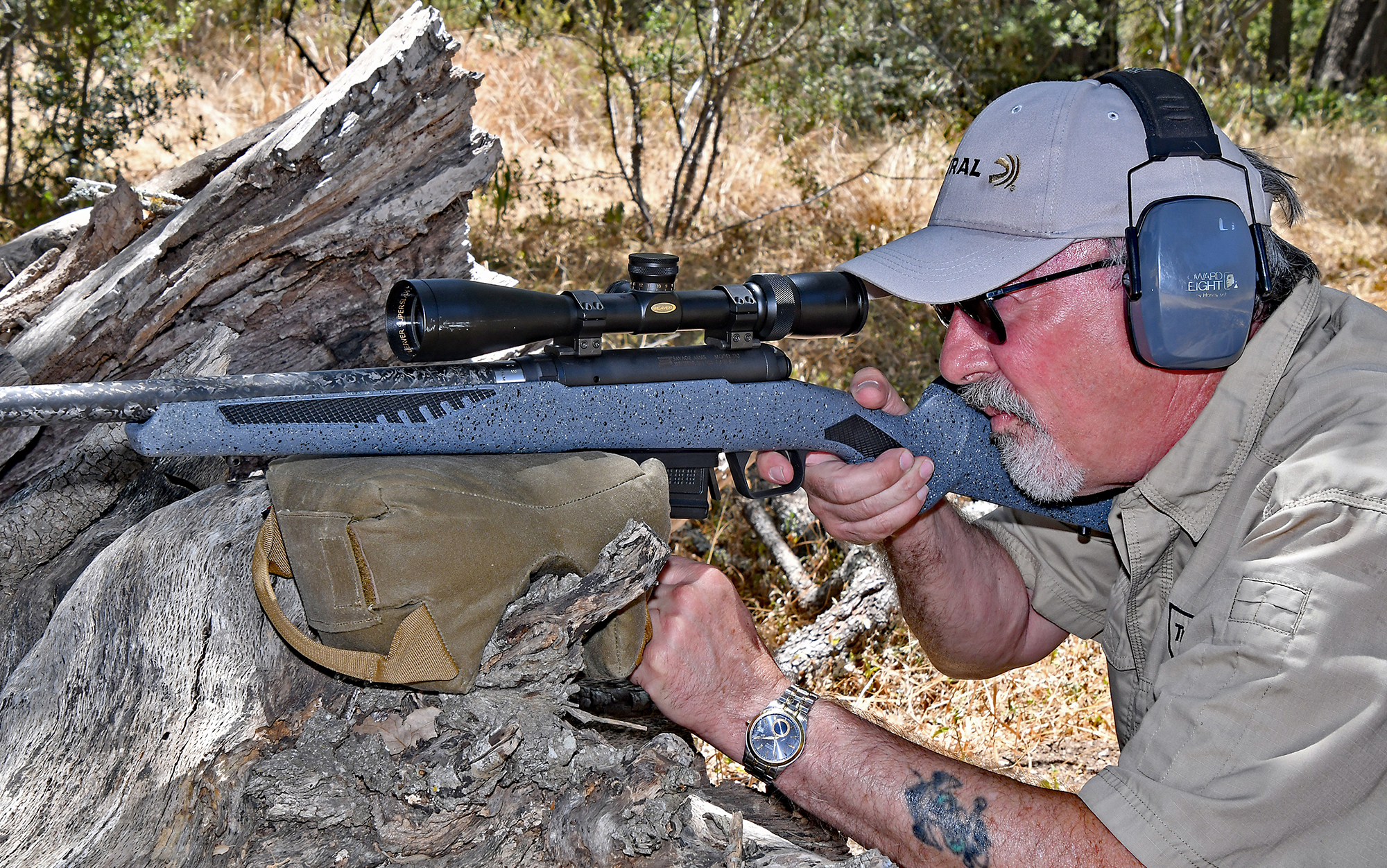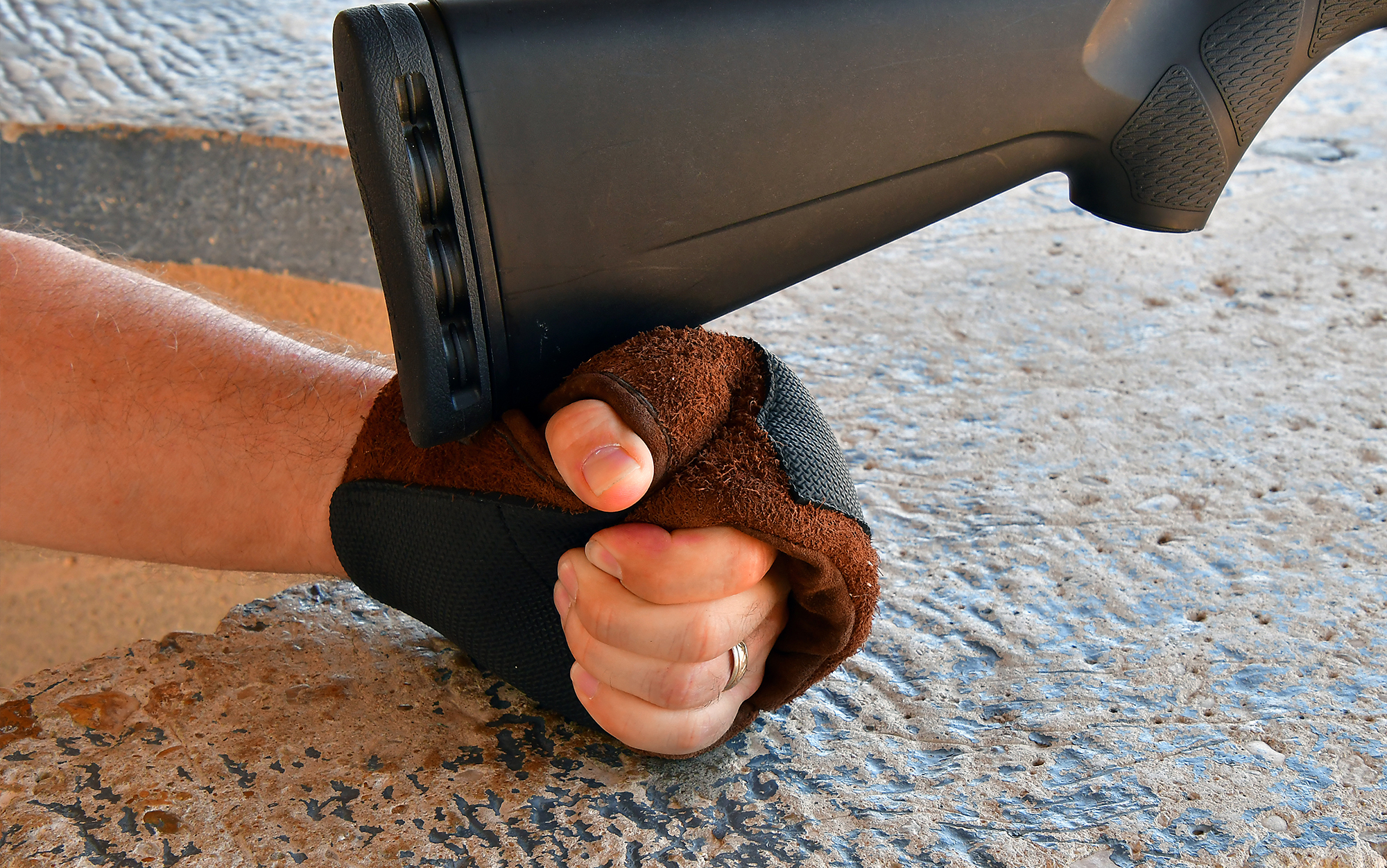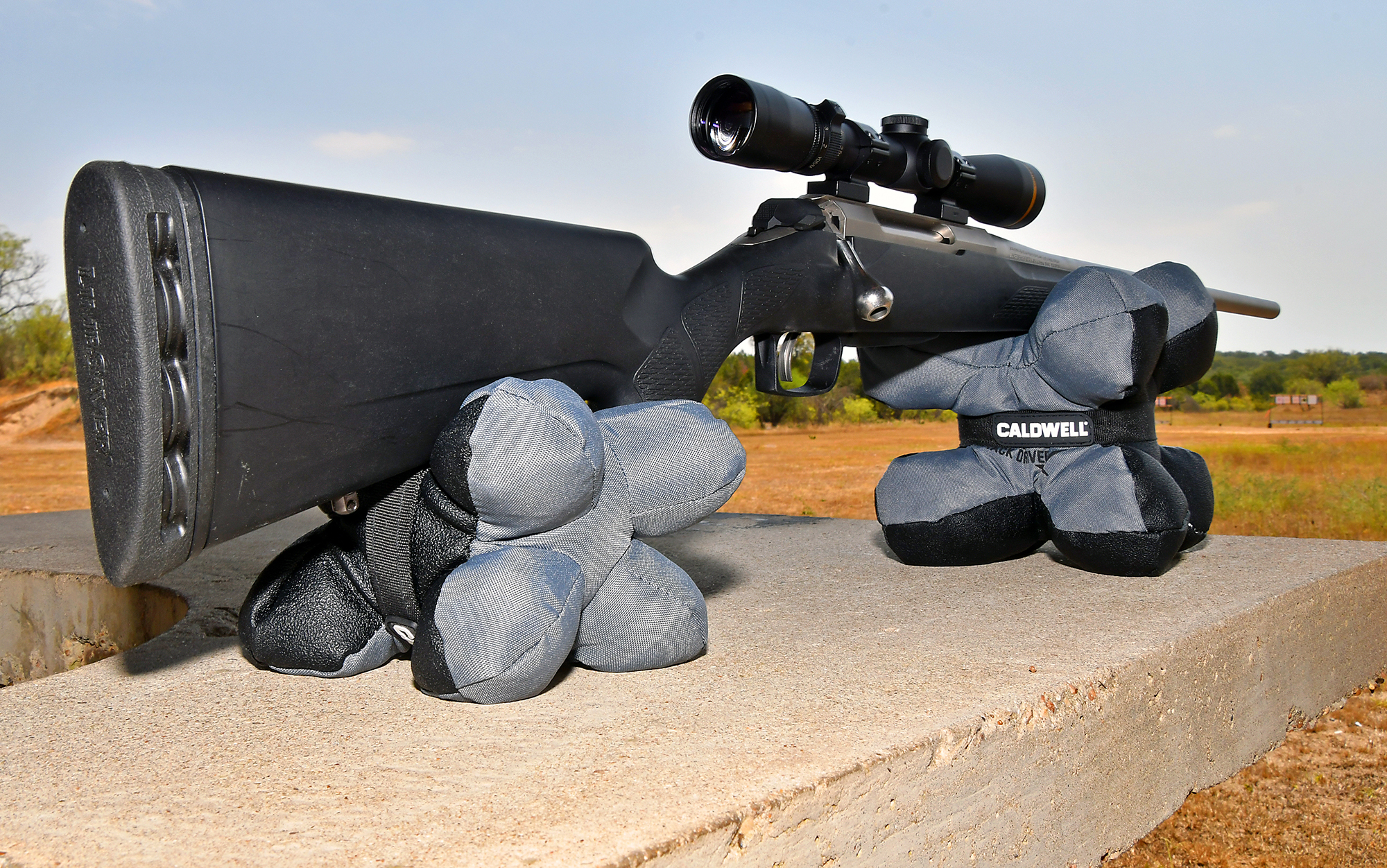We may earn revenue from the products available on this page and participate in affiliate programs. Learn More ›
Published Sep 16, 2023 6:26 PM
When the editors of Outdoor Life asked me to write something instructive about the best shooting rests, my brain went into a spin cycle considering all the options. This topic could easily fill a book.
Anything that supports a rifle and enables you to place a shot precisely can be considered a rest. I have probably killed more animals shooting prone over a backpack than using any other method, but there is now a dizzying array of great products—from bench rests, monopods, and bipods to shooting sticks, shooting bags, and tripods—that can help you make a good shot in most any situation. How to choose?
Well, I reasoned, I am a hunter and so that’s a good place to start. That’s why you won’t find heavy competition bench rests on this list, but you will find affordable rests for zeroing your rifle and practicing from the bench. I also ruled out bipods. Their advantages are well known, but we already have an in-depth review of the best rifle bipods. Shooting sticks have been a great aid to hunters, but many folks are switching to tripod shooting rests, which can provide more elevation and stability, and allow you to switch back and forth between optics and rifles. Shooting bags made the cut because hunters often find themselves in situations where a lightweight shooting bag is the best solution. I ruled out rests designed solely for handguns, but handgun hunters will find some of my selections useful.
How I Chose the Best Shooting Rests
With the focus narrowed to products that are most helpful to hunters, I evaluated each selection considering three factors that matter most to hunters: stability, weight, and cost. With proper technique, all of these shooting rests will provide the stability needed to make your first shot count. Products designed for field use are, for the most part, relatively light. With one notable exception, all selections are affordable within their category. I have used all of these products at the range or in the field.
Best Shooting Rests: Reviews & Recommendations
Best Affordable All-Purpose Bench Rest: Caldwell Stinger Shooting Rest
Key Features
- Spring-loaded front coarse elevation adjustment control
- Fine elevation-adjustment rear control
Pros
- Good stability
- Sturdy construction
- Can be used with ARs
- Affordable
Cons
- Footprint may be too long for smaller benches
- Assembly required
The Caldwell Stinger is a sturdy, versatile bench rest that employs molded, V-shaped supports with a grippy surface for both the forend and buttstock. I was initially skeptical about the stability of the supports, but the rest proved to be superbly stable in range testing. The front support slides forward and backward on twin rails, and locks into position with two cam locks. A front adjustment knob provides ample coarse elevation adjustment, while a knob under the rear support provides fine elevation adjustment.
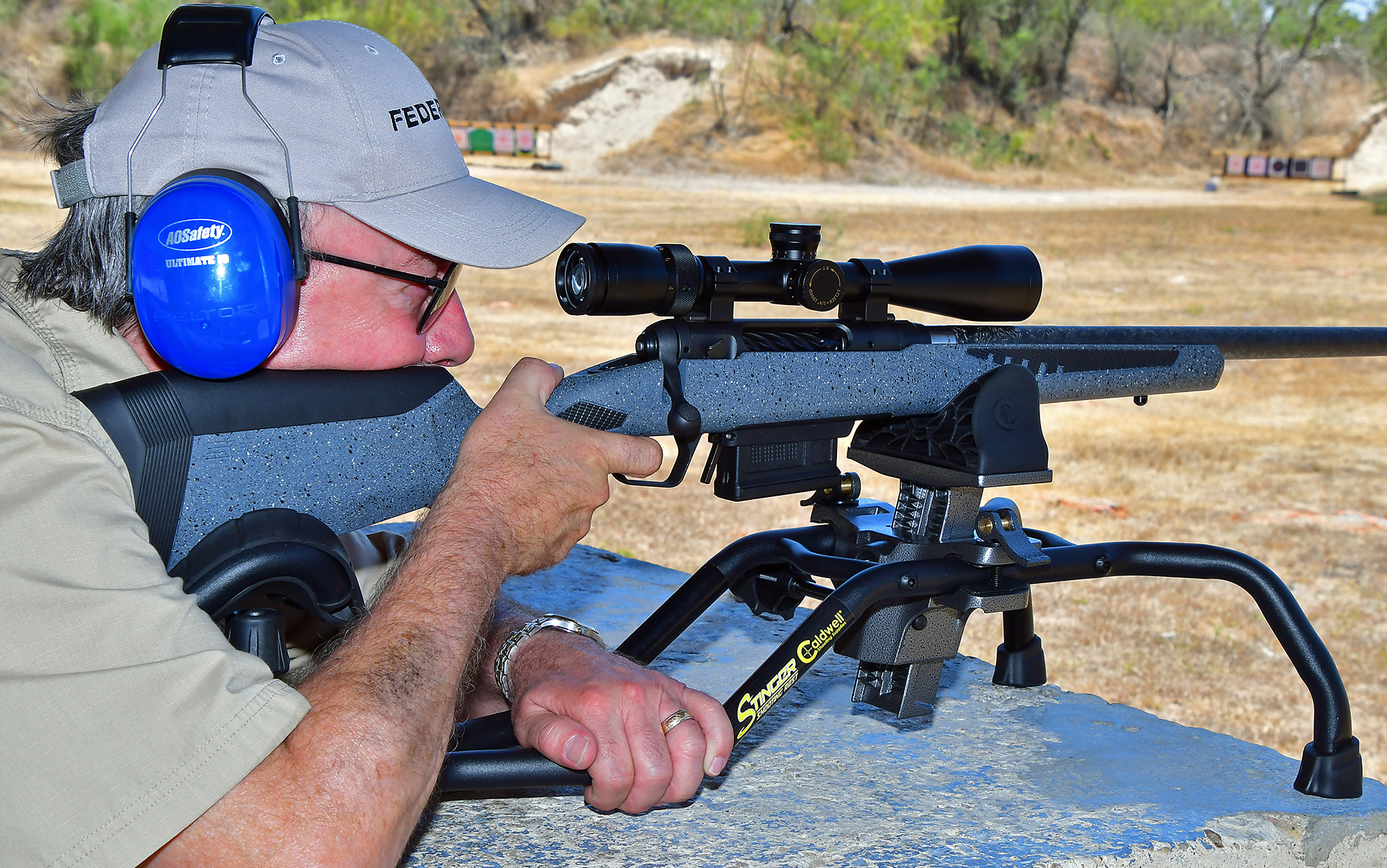
As I increased elevation with this knob, I noticed a slight amount of wobble, but that was easily eliminated by applying a little sideways pressure to the rear of the rest with the support hand. I quickly decided that this rest will see a lot of use in future rifle testing. The first test group I fired, using a Savage Model 110 Carbon Predator rifle in 6.5 Creedmoor, measured just 0.26 inch. The Stinger has an MSRP of $149.99, but you can find it for considerably less.
Best Budget Bench Rest: Champion Tri Stance
Key Features
- 2.5 inches of vertical adjustment
- Pre-filled front and rear bags
- Non-marring forend stop
Pros
- Compact design
- Sturdy metal construction
- Affordable
Cons
- Rubber feet can be lost
- Not optimal for ARs
The Champion Tri-Stance rest has been my go-to rest for many years for testing rifles at the bench. Some bench rests practically take the shooter out of the equation, but the Tri-Stance does not. You still must apply marksmanship fundamentals, like breathing and trigger control—and those skills are perishable without practice. That’s one reason I like this rest. The sturdy, compact three-legged front rest, made of steel and aluminum, is topped with a synthetic bag pre-filled with polymer pellets.
It has a lockable elevation-adjustment wheel, with 2.5 inches of vertical adjustment, and a non-marring forend stop for consistent rifle positioning. Each leg is adjustable for height and has removable rubber feet covering metal spikes. The rest comes with a pre-filled, V-shaped rear bag. My only knock on this rest is that the rubber feet can be easily lost. This can be cured by simply gluing the feet on. The Tri-Stance has a MSRP of just $89.99, but you can find it for less.
Best Overall Tripod Rest: Really Right Stuff TFCT-24L
Key Features
- Strong four-section carbon fiber legs
- 25.9 inch collapsed length
- 68.9 inch maximum height
- Bubble level
- Works with a variety of high-quality RRS heads, rails, and clamps
Pros
- Strong but lightweight
- Good stability in all shooting positions
- Ultra-smooth ball head movement
- Allows for prone shooting
Cons
Hunters who demand the very best—and are willing to pay for it—will find much to like in TFCT tripods from Really Right Stuff. The TFCT-24L model I tested provided the best combination of strength, stability, and light weight of any full-size tripod rest I’ve tested. It also has a bit of sticker shock with an MSRP of $1,470. I tested it with Really Right Stuff’s Vyce mount, with quick-release plate, which adds another $380 to the cost, but was also the best clamp-style head I tested.
The non-marring jaws of the clamp move at the same time, keeping a rifle stock centered, and are angled inward at the top. They pull a rifle stock down when tightened, unlike others that flare out, which can cause rifles to pop out of a clamp under heavy recoil. The variable-tension ball head beneath the clamp is joyfully smooth through its full range of motion.

The legs of the tripod extend and retract smoothly and quietly, and will spread far enough apart to allow for shooting prone. The tripod weighs just 4.5 pounds. Adding the Vyce head bumps weight to 5 pounds, 14 ounces, but Really Right Stuff is working on a lighter version of the Vyce head. The company also makes a host of other heads and attachment hardware. One item gaining traction with serious backcountry hunters is the Universal SOAR Rail, an Arca-Swiss type rail that can be installed on virtually any type of rifle forend using RRS kits. With this in place, you can drop the rifle onto any ball head that has an Arca-Swiss clamp on top, such as the lightweight PT-Scout Pan-Tilt head, making a great combo for backcountry hunting.
Best for ARs at the Bench: Caldwell Precision Turret Shooting Rest
Key Features
- Designed for ARs
- Ample vertical adjustment
- Variable-tension tilt/pan controls
Pros
- Heavy-duty construction
- Rock-solid stability
- Accommodates guns with 30-round magazines
- Affordable
Cons
The Caldwell Precision Turret Rest is the best rest I’ve ever used for zeroing and testing ARs from the bench. It’s a tripod design with an extendable front leg providing up to 6 inches of vertical adjustment. You use the rest by inserting your rifle’s forend into a non-marring clamp. The rear “rest” is a platform that you rest the pistol grip on. A wheel attached to the rear platform provides fine elevation adjustment. The rest has variable-tension pan and tilt controls, and the ball-bearing panning system has a 58-degree arc when using a rifle with an extended magazine. The rest is relatively compact, but it’s built like a tank and provides great stability. If you want to know just how accurate your AR can be, this is the rest to use. It’s also affordable, with an MSRP of $179.99 and a street price below that.
Best Rest for a Blind: BOG Deathgrip Infinite Carbon Fiber
Key Features
- Large-diameter, three-section carbon fiber legs
- 59-inch maximum height
- Arca-Swiss mount system
- Rubber feet with removable spikes
Pros
- Good stability
- Smooth, variable-tension ball head
- Allows for prone shooting
Cons
I didn’t expect to like the BOG Deathgrip Infinite Carbon Fiber tripod rest as much as I do because of its hefty weight of 8 pounds, 5 ounces, with the Deathgrip ball head attached. Few hunters are willing to carry that much extra weight into the mountains unless a guide or partner is toting it for them, but that weight makes the Deathgrip Infinite tripod a joy to use in a hunting blind. I found stability to be on par with tripod rests costing far more money.
The legs have rubber feet with removable spikes. Toggle switches at the top of the legs control their spread, but will allow you to shoot prone. Pan, tilt, and cant are controlled with a variable-tension ball head that moves smoothly through a full range of motion. The head uses an Arca-Swiss mount that allows you to switch back and forth between a rifle or optic. MSRP is $449.99, but it often retails for far less.
Best Fast-Deploy Tripod Rest: Primos Trigger Stick Apex
Key Features
- One-hand adjustment
- Three-section carbon fiber-wrapped aluminum legs
- 62-inch maximum height
- Bubble level
Pros
- Trigger Stick adjustability
- Fast to deploy
- Rapidly adjusts to uneven terrain
Cons
- More wobble than others from standing position
- Can be a little noisy
- Does not allow for prone shooting
With the same rapid adjustability and adaptability to uneven ground as the famed Primos Trigger Sticks, the Trigger Stick Apex tripod rest is faster to get into action than traditional tripod designs, but there are some tradeoffs. The Apex has a bit more wobble than other tested tripod rests, but that can be overcome with proper shooting technique or adding a second point of support under the buttstock. The Apex is all about speed, and its non-marring gun clamp allows for fast rifle mounting. Once you have it adjusted, you just insert the rifle and toggle a cam lock to secure it.
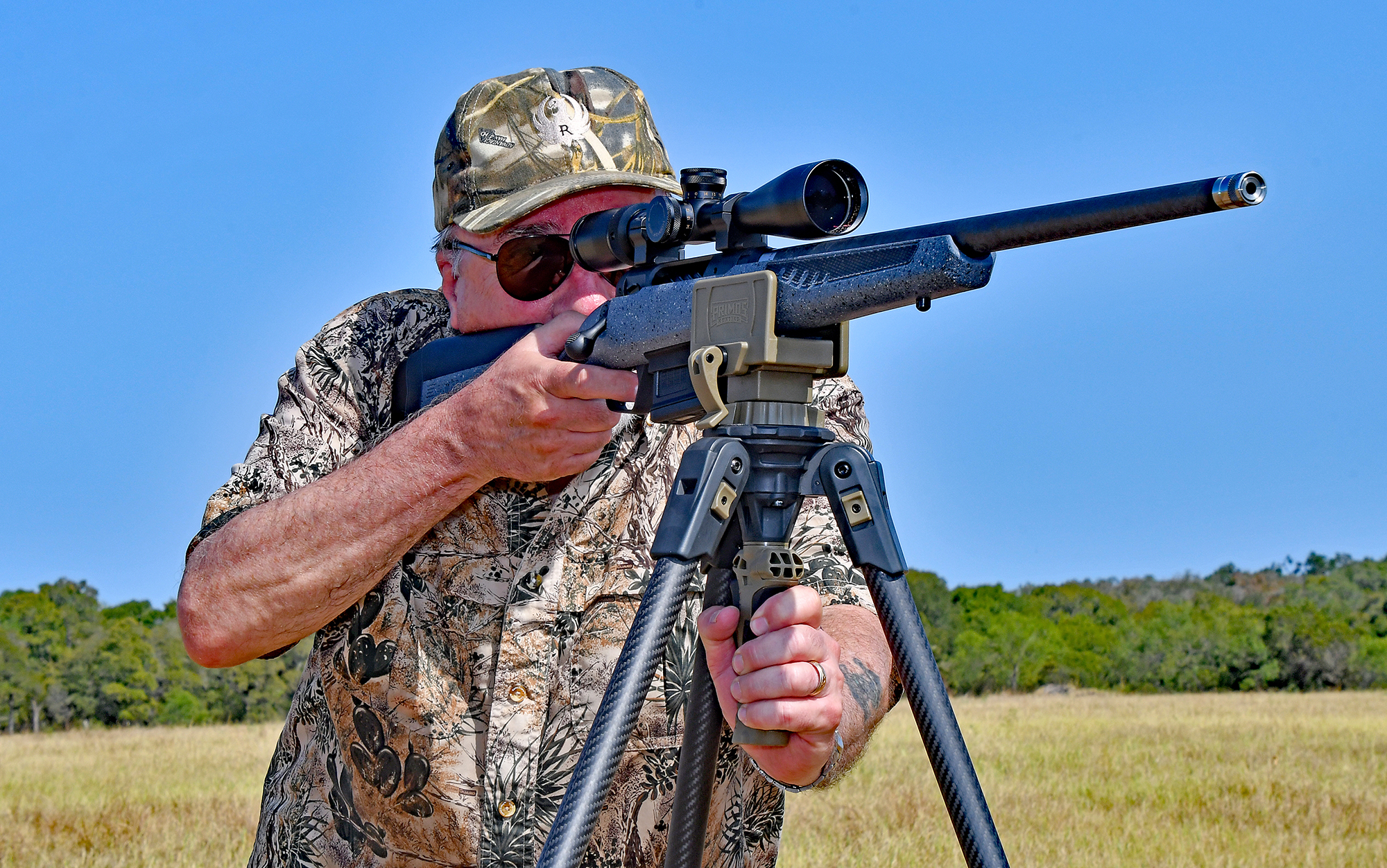
The clamp head pans smoothly, but elevation adjustments must be made with the trigger mechanism. The Apex is even faster to use if you purchase the optional Apex MagnaSwitch ball head, which uses magnetic components to quickly mount a rifle and has a wide range of fine adjustments. Each tripod leg has a three-position switch at the top that controls the spread of the legs. The tripod has a collapsed length of 32 inches and weighs 7 pounds, 5 ounces with the gun clamp. MSRP is $449.99.
Best Affordable Lightweight Tripod: BOG Deathgrip Sherpa
Key Features
- Two-section carbon fiber legs
- Arca-Swiss mount system
- Rubber feet with removable spikes
Pros
- Lightweight
- Good stability with center post lowered
- Smooth, variable-tension ball head
- Allows for prone shooting
Cons
- Less stable with center post extended
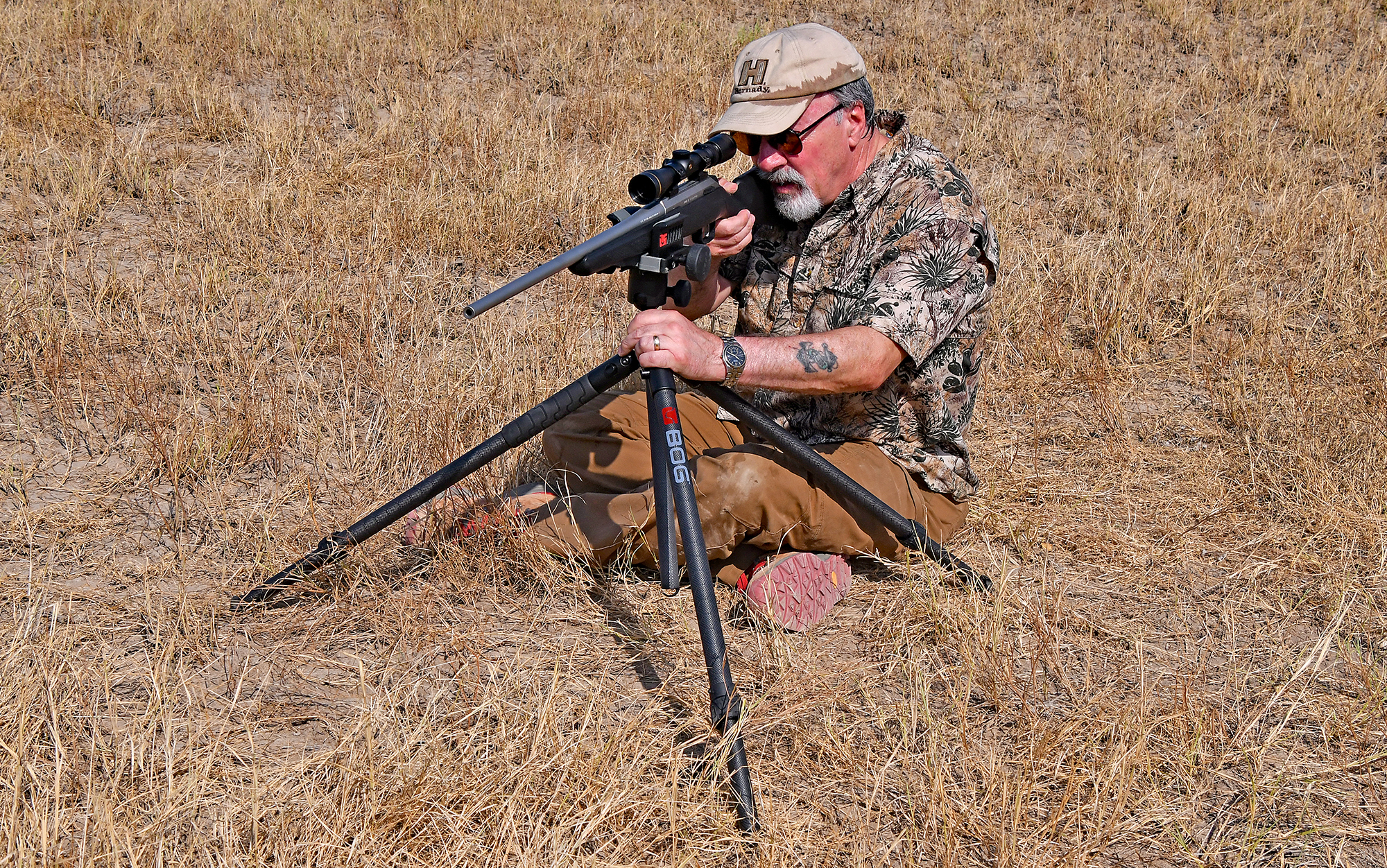
The BOG Deathgrip Sherpa carbon fiber tripod rest has many of the same features as the BOG Deathgrip Infinite tripod, including the Deathgrip ball head with Swiss-Arca mount, but it comes in a smaller, lighter package weighing just 4 pounds, 11 ounces. Unless you’re very short of stature, you likely won’t shoot off this tripod standing. It’s best used from kneeling or sitting positions because it employs a center post, and tripods with center posts have more wobble when fully extended. With the center post lowered and locked down, the Sherpa is very stable, and is a great choice for the backcountry hunter so long as you can shoot seated or kneeling. MSRP is $399.99
Best Shooting Bag: Armageddon Gear Game Changer
Key Features
- Heavy duty waxed canvas
- Hidden zippered fill opening
- Dual webbing carrying straps
Pros
- Adaptable to most any shooting situation
- Lightweight with light fill option
Cons
- Expensive compared to other shooting bags
The Armagedon Gear Game Changer shooting bag is a favorite of PRS shooters and Outdoor Life shooting editor John B. Snow, who has used it to kill a lot of game animals and swears by it in competitions as well. The bag’s dimensions (6 x 9 x 7 inches) make it easy to slip in a pack, and its rabbit-ear configuration is adaptable to a wide variety of shooting situations, such as shooting off a rock, tree branch, fence post, or log.
It makes a great rear support when shooting prone. You can choose from several colors and select standard-weight fill or a new Git Lite fill. I prefer the lighter fill, which brings the bag’s weight to just 1 pound, 13 ounces. In that configuration, MSRP is $169.95. That’s more than you’ll pay for other bags, but it’s worth it. Two bags from the newly launched Hunt line deserve special mention. The first is a smaller Game Changer, made of leather, that looks like something Hemingway or Ruark would have used. The second is the Channel Lock bag, which weighs just 11 ounces and uses opposing channels to shoot steadily off most any surface.
Best Rear Support for Shooting Prone: FTW SAAM Ambidextrous Dog Paw
Key Features
- Simple, effective design
- Ambidextrous
Pros
- Lightweight
- Grippy rubber surfaces
- Open-finger design allows enough dexterity to accomplish other tasks while building shooting position.
- Affordable
Cons
- Available only from FTW Ranch
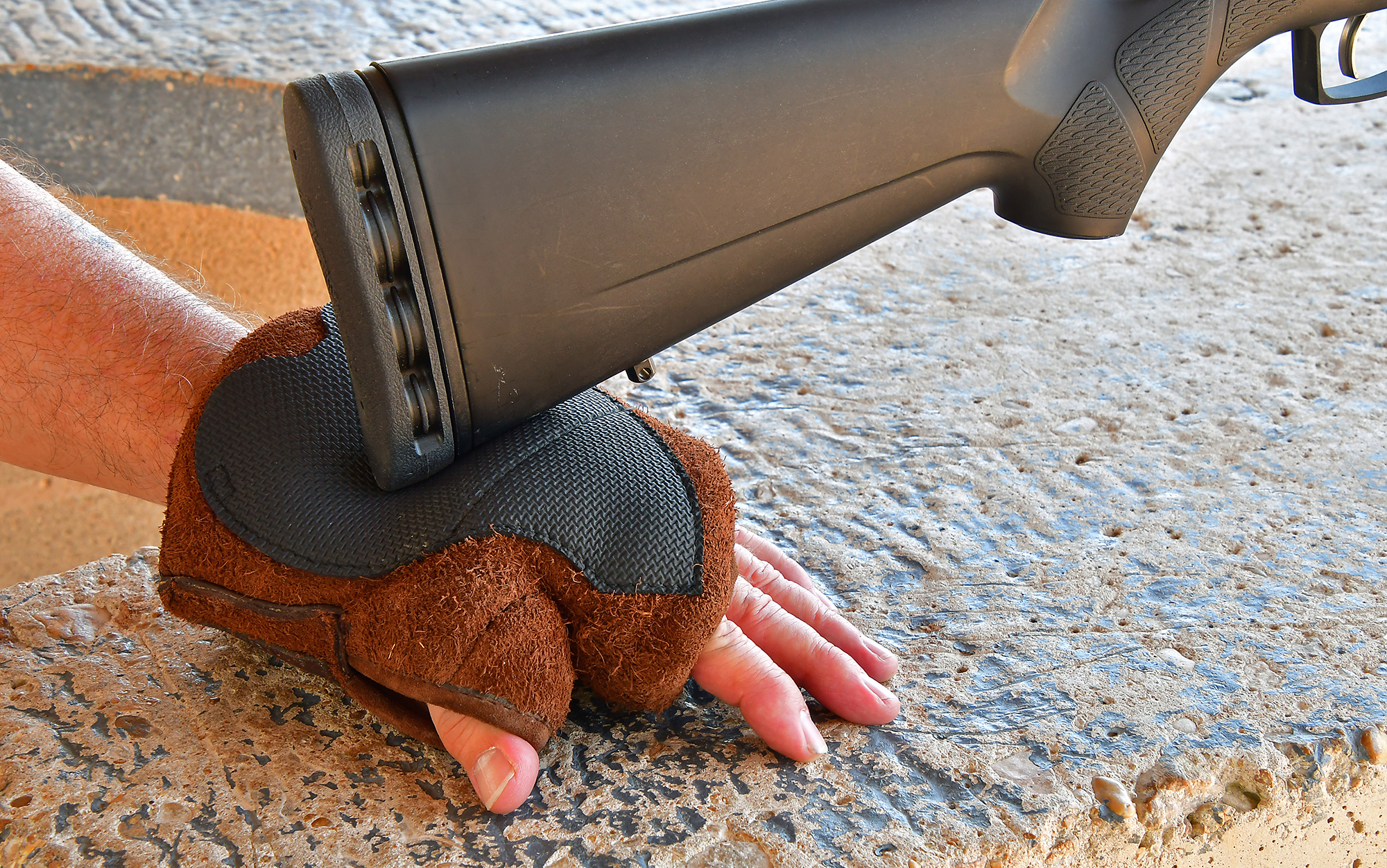
I first discovered the Dog Paw shooting pad at the shooting facilities of the famous FTW Ranch in Texas. The proprietary Dog Paw is a rugged, heavily padded, open-fingered mitt to wear on the supporting hand and use as a rear rest under the buttstock when shooting prone. I used it, in combination with a bipod, to make the best long-range shot I’ve ever made, pacing a bullet less than 3 inches from a 3-inch bullseye on steel at 40 yards beyond 1 mile. You can use it with the hand flat or by making a fist to adjust bore height. Made mostly of leather and neoprene, this glove rest is light and a great addition to your gear if you anticipate shooting prone. MSRP: $62.99.
Honorable Mention, a Bag for the Bench: Caldwell Tack Driver X Bag
Key Features
- Innovative, eight-lobe design
- Rubberized bottom material
- Plastic pellet filling
Pros
- Adaptable to many shooting situations
- Works well at the bench
- Affordable
Cons
The new Caldwell Tack Driver X Bag looks unconventional. It has eight lobes emanating from its center like stubby starfish arms, but that makes it highly adaptable to shooting from a wide variety of surfaces. The dimensions are just 8 x 8 x 8 inches, but it has a measured weight of 9 pounds, 2 ounces, which limits its utility for many hunting situations. It is, however, a solid and affordable rest for shooting from the bench or a stationary position. That function is enhanced with a rubberized bottom material that minimizes sliding from recoil. There’s also a mini version, which works well as a rear rest, measuring 5.5 x 5.5 x 5.5 inches. MSRPs are $69.99 for the full-size bag and $39.99 for the mini.
Things to Consider Before Buying the Best Shooting Rest

All rests do not provide the same level of stability from all shooting positions. Someone who can shoot with one-MOA accuracy prone using a bipod and rear support bag may only shoot with two- or three-MOA accuracy standing and using a tripod. It’s best to have a variety of options tailored to your specific style of hunting, the type of terrain you’re hunting in, the types of shot opportunities you may encounter, and the shooting positions you’re most likely to employ. The goal is to choose rests that provide the greatest stability while also being portable enough for the given hunting scenario.
Final Thoughts
Any rest is better than no rest, and two points of support are almost always better than one. But in order to get the most out of any of the best shooting rests, you must practice with them from practical field positions. Develop a habit of employing proper technique for each type of rest and build the most stable shooting position possible. Also practice deploying your shooting rest quickly so you can get on target fast, without fumbling around, to break a stable, precise shot.
https://www.outdoorlife.com/gear/best-shooting-rests/
